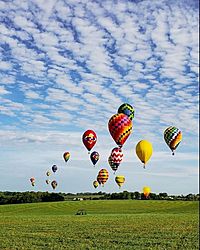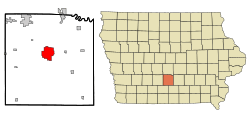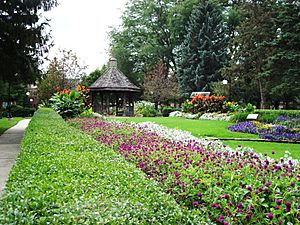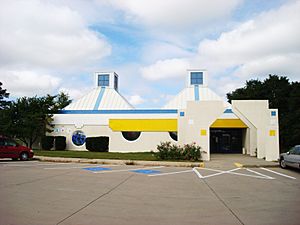Indianola, Iowa facts for kids
Quick facts for kids
Indianola, Iowa
|
|
|---|---|
|
City
|
|

National Balloon Classic in Indianola, Iowa
|
|

Location of Indianola, Iowa
|
|
| Country | United States |
| State | Iowa |
| County | Warren |
| Government | |
| • Type | Mayor–council |
| Area | |
| • Total | 11.44 sq mi (29.62 km2) |
| • Land | 11.44 sq mi (29.62 km2) |
| • Water | 0.00 sq mi (0.00 km2) |
| Elevation | 958 ft (292 m) |
| Population
(2020)
|
|
| • Total | 15,833 |
| • Density | 1,384.61/sq mi (534.60/km2) |
| Time zone | UTC-6 (Central (CST)) |
| • Summer (DST) | UTC-5 (CDT) |
| ZIP code |
50125
|
| Area code(s) | 515 |
| FIPS code | 69-38280 |
| GNIS feature ID | 468071 |
Indianola is a city in Warren County, Iowa, United States. It is the main city, also known as the county seat, of Warren County. Indianola is located about 19 miles south of downtown Des Moines. In 2020, the city had a population of 15,833 people.
Indianola is famous for a few things. It hosts the National Balloon Classic, which is a nine-day hot air balloon festival held every summer. It is also home to the Des Moines Metro Opera, a big summer opera festival, and Simpson College.
Contents
History of Indianola
Indianola was started in 1849. It was chosen as the county seat for Warren County because it was close to the center of the new county. The city got its name from a newspaper story about a Texas town called Indianola. The city officially became a town in 1863.
Geography and Climate
Indianola covers a total area of about 11.25 square miles (29.14 square kilometers), and all of it is land. The southern end of the Summerset Trail, a popular path, is located in Indianola.
Indianola's Climate
Indianola has a climate known as a hot-summer humid continental climate. This means it has warm, humid summers and cold winters.
| Climate data for Indianola, Iowa, 1991–2020 normals, extremes 1893–present | |||||||||||||
|---|---|---|---|---|---|---|---|---|---|---|---|---|---|
| Month | Jan | Feb | Mar | Apr | May | Jun | Jul | Aug | Sep | Oct | Nov | Dec | Year |
| Record high °F (°C) | 70 (21) |
79 (26) |
89 (32) |
92 (33) |
106 (41) |
105 (41) |
112 (44) |
113 (45) |
104 (40) |
95 (35) |
82 (28) |
70 (21) |
113 (45) |
| Mean maximum °F (°C) | 54.9 (12.7) |
59.0 (15.0) |
74.3 (23.5) |
82.7 (28.2) |
88.0 (31.1) |
91.5 (33.1) |
94.5 (34.7) |
93.4 (34.1) |
90.4 (32.4) |
84.6 (29.2) |
70.9 (21.6) |
58.6 (14.8) |
96.0 (35.6) |
| Mean daily maximum °F (°C) | 31.7 (−0.2) |
36.3 (2.4) |
49.5 (9.7) |
62.1 (16.7) |
71.9 (22.2) |
81.4 (27.4) |
85.5 (29.7) |
84.0 (28.9) |
77.6 (25.3) |
64.8 (18.2) |
49.6 (9.8) |
36.9 (2.7) |
60.9 (16.1) |
| Daily mean °F (°C) | 21.7 (−5.7) |
25.8 (−3.4) |
38.3 (3.5) |
50.0 (10.0) |
60.9 (16.1) |
70.7 (21.5) |
74.7 (23.7) |
72.8 (22.7) |
65.0 (18.3) |
52.5 (11.4) |
38.8 (3.8) |
27.1 (−2.7) |
49.9 (9.9) |
| Mean daily minimum °F (°C) | 11.6 (−11.3) |
15.2 (−9.3) |
27.1 (−2.7) |
37.9 (3.3) |
49.9 (9.9) |
60.0 (15.6) |
64.0 (17.8) |
61.6 (16.4) |
52.4 (11.3) |
40.1 (4.5) |
27.9 (−2.3) |
17.4 (−8.1) |
38.8 (3.8) |
| Mean minimum °F (°C) | −11.7 (−24.3) |
−6.4 (−21.3) |
7.0 (−13.9) |
22.3 (−5.4) |
34.7 (1.5) |
46.5 (8.1) |
53.5 (11.9) |
51.1 (10.6) |
36.5 (2.5) |
23.8 (−4.6) |
10.1 (−12.2) |
−3.3 (−19.6) |
−16.1 (−26.7) |
| Record low °F (°C) | −33 (−36) |
−35 (−37) |
−20 (−29) |
−2 (−19) |
21 (−6) |
36 (2) |
40 (4) |
38 (3) |
23 (−5) |
4 (−16) |
−11 (−24) |
−26 (−32) |
−35 (−37) |
| Average precipitation inches (mm) | 0.91 (23) |
1.42 (36) |
1.94 (49) |
3.88 (99) |
5.58 (142) |
5.72 (145) |
4.32 (110) |
3.90 (99) |
3.86 (98) |
3.02 (77) |
1.85 (47) |
1.40 (36) |
37.8 (961) |
| Average snowfall inches (cm) | 8.5 (22) |
8.2 (21) |
3.7 (9.4) |
1.0 (2.5) |
0.3 (0.76) |
0.0 (0.0) |
0.0 (0.0) |
0.0 (0.0) |
0.0 (0.0) |
0.5 (1.3) |
1.9 (4.8) |
6.7 (17) |
30.8 (78.76) |
| Average precipitation days (≥ 0.01 in) | 5.1 | 6.6 | 7.3 | 10.0 | 12.3 | 11.0 | 8.0 | 8.9 | 7.6 | 7.7 | 6.0 | 5.8 | 96.3 |
| Average snowy days (≥ 0.1 in) | 3.7 | 3.9 | 1.7 | 0.6 | 0.1 | 0.0 | 0.0 | 0.0 | 0.0 | 0.4 | 0.9 | 3.2 | 14.5 |
| Source 1: NOAA | |||||||||||||
| Source 2: National Weather Service | |||||||||||||
Population and People
| Historical population | ||
|---|---|---|
| Year | Pop. | ±% |
| 1860 | 836 | — |
| 1870 | 1,428 | +70.8% |
| 1880 | 2,146 | +50.3% |
| 1890 | 2,254 | +5.0% |
| 1900 | 3,261 | +44.7% |
| 1910 | 3,283 | +0.7% |
| 1920 | 3,628 | +10.5% |
| 1930 | 3,488 | −3.9% |
| 1940 | 4,123 | +18.2% |
| 1950 | 5,145 | +24.8% |
| 1960 | 7,062 | +37.3% |
| 1970 | 8,852 | +25.3% |
| 1980 | 10,843 | +22.5% |
| 1990 | 11,340 | +4.6% |
| 2000 | 12,998 | +14.6% |
| 2010 | 14,782 | +13.7% |
| 2020 | 15,833 | +7.1% |
| Source: Source: U.S. Decennial Census |
||
2020 Census Information
In 2020, Indianola had 15,833 people living there. There were 5,886 households, which are groups of people living together in one home. The city had about 1,399 people per square mile.
Most of the people in Indianola (92.8%) were White. Other groups included 1.0% Black or African American, 0.7% Asian, and 0.2% Native American. About 2.8% of the population identified as Hispanic or Latino.
The average age in Indianola was 36 years old. About 28.5% of the residents were under 20 years old. Many households (32.3%) had children under 18 living with them.
Religious Groups
In Indianola, many people belong to different religious groups:
- 21% are Catholic.
- 64.5% are Protestant.
- 14.1% do not have a religious affiliation.
- 0.4% are Karen Buddhist. A Karen Buddhist temple was started in 2022 at the old St. Thomas A. Catholic Church site.
City Government
Indianola is led by a mayor and a city council. Here are the current elected officials:
| Position | Name | Term expires |
|---|---|---|
| Mayor | Steve Richardson | 2025 |
| City Council Ward 1 | Melissa Sones | 2027 |
| City Council Ward 2 | Ron Dalby | 2025 |
| City Council Ward 3 | Steve Armstrong | 2027 |
| City Council Ward 4 | Christina Beach | 2025 |
| City Council At-Large | Josh Rabe | 2027 |
| City Council At-Large | Vacant | 2025 |
Arts and Culture
Indianola is a center for arts and culture. It is home to the National Balloon Classic and the National Balloon Museum.
Places to Visit
- Buxton Park Arboretum: A beautiful park with many different trees and plants.
- Des Moines Metro Opera: A place to enjoy opera performances.
- Summerset Winery: A local winery.
- Simpson College: A college campus with various events.
- U.S. Ballooning Hall of Fame: A museum celebrating the history of ballooning.
Education in Indianola
Indianola has its own public school system, called the Indianola Community School District.
Public Schools
Indianola has four elementary schools:
- Whittier Elementary
- Emerson Elementary
- Irving Elementary
- Wilder Elementary
There is one middle school, Indianola Middle School. Indianola High School is the only high school in the city.
Colleges and Universities
Simpson College is a liberal arts college located in Indianola. It was founded in 1860 and is connected to the United Methodist Church.
Transportation and Infrastructure
Roads and Highways
Iowa Highway 92 goes through Indianola from east to west. It crosses US Highways 65 and 69, which are just southeast of the city center.
Railroads (Past)
Indianola no longer has train service. In the past, it was a stop for two different railroad lines: the Chicago, Burlington and Quincy Railroad and the Chicago, Rock Island and Pacific Railroad. These lines were used to move goods and even passengers. However, both lines stopped operating in the area by the early 1990s. Part of the old Rock Island line was turned into the Summerset Trail, which is now used for walking and biking.
Air Travel
For air travel, people in Indianola use the Des Moines International Airport. It is about 13 miles northwest of the city and offers both passenger flights and general aviation services. There are also two smaller, privately owned airports near Indianola: Nash Field (south of Indianola) and Laverty Field (north of Indianola).
Notable People from Indianola
Many interesting people have connections to Indianola, including:
- Casey Blake: A baseball player and assistant coach.
- George Washington Carver: A famous botanical researcher and educator.
- Dayton Duncan: A writer and documentary filmmaker.
- Junior D. Edwards: A Medal of Honor recipient.
- John Paul Jones: A well-known painter.
- Lane Sisters: Four sisters who were singers, including film actress Priscilla Lane.
- Chris Street: An Iowa Hawkeye basketball player.
- Ilo Browne Wallace: The Second Lady of the United States, married to Vice President Henry A. Wallace.
- Ed Yost: The inventor of the modern hot air balloon.
Technology
Indianola has a special fiber optic network that provides very fast internet (Gigabit-capable) to the city. It also has programs to help new technology businesses grow, connecting activities at its schools and Simpson College to the local tech economy.
See also
 In Spanish: Indianola (Iowa) para niños
In Spanish: Indianola (Iowa) para niños
 | Laphonza Butler |
 | Daisy Bates |
 | Elizabeth Piper Ensley |




